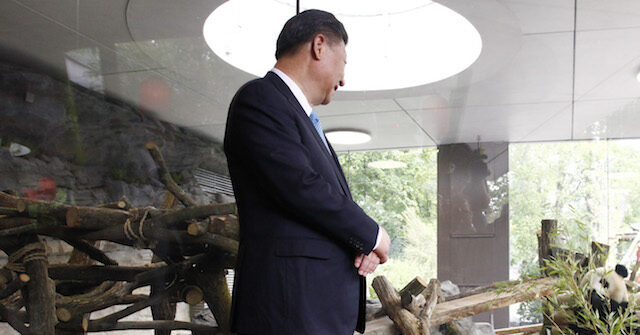Top News
Xi Jinping Pledges to Renew America’s Strategic Panda Reserve

Speaking at a reception for business leaders in San Francisco on November 15, Chinese dictator Xi Jinping said more pandas will be sent to the United States as “envoys of friendship between the Chinese and American peoples.”
“We are ready to continue our cooperation with the United States on panda conservation, and do our best to meet the wishes of the Californians so as to deepen the friendly ties between our two peoples,” Xi said at the gathering of business leaders, held shortly after his meeting with President Joe Biden.
“Recently, the three pandas at Smithsonian’s National Zoo in Washington D.C. have returned to China. I was told that many American people, especially children, were really reluctant to say goodbye to the pandas, and went to the zoo to see them off,” he said.
“I also learned that the San Diego Zoo and the Californians very much look forward to welcoming pandas back,” Xi added.
The Smithsonian National Zoo’s pandas, two adults named Mei Xiang and Tian Tian plus their three-year-old cub Xiao Qi Ji, returned to China on November 8.
Xiao Qi Ji’s name means “Little Miracle,” a name chosen in honor of his seemingly impossible birth to Mei Xiang, who was thought to be too old to give birth. His birth was an especially heartening event during the depths of the Wuhan coronavirus pandemic, bringing record levels of traffic to the National Zoo’s online Panda Cam.
Male giant panda Xiao Qi Ji relaxes in his enclosure during his second birthday at the Smithsonian National Zoo on August 21, 2022, in Washington, DC. (Anna Moneymaker/Getty Images)
The departing pandas are slated to live out their days with about 150 other pandas at a nature preserve in Sichuan province.
The New York Times mourned the departure of the Smithsonian’s bears as the end of “panda diplomacy,” which began after First Lady Patricia Nixon told Chinese Premier Zhou Enlai she loved pandas during President Richard Nixon’s visit to Beijing in 1972.
China actually gave its first pandas to the United States in 1941, when Soong Mei-ling, wife of Kuomintang leader Chiang Kai-shek, gave America a “chubby pair of comical black and white furry pandas” as thanks for helping with Chinese refugees during the Sino-Japanese War.
There have been pandas in Washington ever since. Mei Xiang and Tian Tian came to the National Zoo in 2000 after the two previous pandas died from kidney disease and heart failure. China provides pandas on contracts ranging from three to ten years. Cubs are usually sent back to China after three or four years, and adult pandas return when they reach advanced ages, as Mei Xiang and Tian Tian have.
As Xi hinted in his speech, the San Diego Zoo sent its elderly panda and her cub back to China in 2019. The last remaining giant pandas in the United States currently live at Zoo Atlanta, but they are scheduled to return to China next year.
American and Chinese officials have made no firm statements that “panda diplomacy” was over. All of the pandas returning to China are doing so according to the usual schedule. The Smithsonian has not asked for new pandas to replace Mei Xiang and Tian Tian yet, and Chinese officials have not indicated they would refuse such a request.
Many observers nevertheless believe China would stop sending pandas as relations between Washington and Beijing turned sour. The Associated Press (AP) noted last week there has been some pressure from the Chinese public to demand the return of giant pandas, accompanied by “unproven allegations that U.S. zoos mistreated the pandas.”
Read the full article here


















